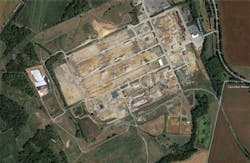Quantum Loophole Plans 2,100 Acre Data Center Campus in Maryland
Quantum Loophole’s big vision now has a capital partner and a location for its first gigawatt-scale “data center city.” The data center startup has formed a joint venture with TPG Real Estate Partners to acquire a 2,100-acre industrial site near Frederick, Maryland for its first major campus.
The Quantum Loophole team believes the hyperscale computing sector is reaching levels of scale that require new types of real estate solutions. The company had targeted the Northern Virginia market for its initial project, but will seek to serve the region from Maryland, which offers more abundant land and a new package of tax incentives. The strategy is a big bet that Frederick County can become the next sub-market of Ashburn’s “Data Center Alley”.
The project will tap the massive power infrastructure of the former Alcoa Eastalco Works smelting plant in Adamstown, Md., which is about 25 miles due north of Ashburn. That’s about the same distance from Data Center Alley as Manassas in Prince William County, where a growing data center cluster has emerged.
The Alcoa site offers a gigawatt of transmission power capacity, and Quantum Loophole plans to develop 30- to 120-megawatt data center modules. Josh Snowhorn, Founder and CEO of Quantum Loophole, describes it as “first-ever, mass-scale gigawatt data center community.”
“This project marks the first comprehensive approach to data center development inclusive of environmental impact, efficiency in power use and distribution, fiber connectivity, and a streamlined approach to construction,” said Snowhorn, who said the partnership with TPG Real Estate enables “a truly powerful next-generation clean cloud community that will reshape the industry, raising the bar for accountability, sustainability, and planned future data center development to the next level.”
Another New Player on the Data Center Scene
TPG Real Estate Partners (TREP) will be the project’s capital partner, and will take a minority equity position in Quantum Loophole. TREL is the real estate arm of asset investment firm TPG, which becomes the latest global investor to target the data center sector.
“Demand for cloud computing and cloud-based services has grown rapidly over the past decade, and Frederick County is an important growth outlet for the Northern Virginia data center market,” said Ty Newell, Managing Director at TREP. “We are pleased to partner with the team at Quantum Loophole and look forward to executing on our shared vision for an innovative and sustainable development that will deliver enduring value to the local community.”
With the Adamstown site, the developers are taking advantage of existing power infrastructure to convert an old industrial site to the Internet economy. Alcoa manufactured aluminum at the Eastalco Works, a process that requires large amounts of electricity to operate smelters. The Alcoa facility closed in 2010 and after a period of environmental; remediation, demolition of the facility was completed in 2017.
“With industrial zoning and access to significant power capacity, the development site will offer several benefits to a fast-growing hyperscale tenant base that is intensely focused on speed of delivery,” said TPG’s Newell.
Last year Maryland passed data center tax incentives that offer an exemption from the state sales and use tax for up to 20 years.
“It is outstanding news that this site, on which aluminum was manufactured for more than 35 years, will get new life as the home of a state-of-the-art data center development,” said Maryland Governor Larry Hogan. “As Maryland welcomes more and more data centers to the state, this project is critical in ensuring these companies have the kind of advanced infrastructure needed to be successful as well as secure.”
The Maryland Alternative
From a real estate perspective, the new incentives and fiber routes create an opportunity. Local media reported that the 2,100-acre Alcoa site was acquired for $100 million, or about $48,000 per acre.
That provides very different economics than site selection in Northern Virginia, where the economic value of data centers is boosting land prices. Prime data center development properties in Northern Virginia have recently sold for more than $2 million an acre in Ashburn and nearly $1 million an acre in Prince William County.
Quantum Loophole’s search for tenants will focus on the largest players in hyperscale computing, who operate cloud campuses that concentrate massive amounts of computing power in multiple data center facilities. These data center hubs enable companies to rapidly add server capacity and electric power, creating economies of scale as more workloads migrate into these massive server farms.
Northern Virginia has become the home of the cloud, with the world’s largest cluster of hyperscale data centers for companies like Amazon Web Services, Google, Microsoft and Facebook. Ashburn remains the center of gravity for the industry, but new data center clusters are growing near Dulles Airport, Leesburg and Manassas.
Will Maryland be the next frontier for cloud computing? A key factor is connectivity. Quantum Loophole says its project will be “less than one millisecond by fiber from the heart of the Northern Virginia Internet ecosystem.” Current cross-Potomac fiber routes don’t extend to Adamstown, but the county’s announcement said plans for the project include “investments in robust fiber connectivity.”
Ambitions in Scale, Sustainability
It’s a gamble, but Quantum Loophole is not lacking in vision, ambition, or expertise. The company aims to address capacity planning frustrations common to the very largest data center users. Quantum Loophole’s approach can accommodate development sites for large customers, or creating build-to-suit data centers of up to 600,000 square feet.
The leadership team includes Snowhorn, Chief Technical Officer Scott Noteboom, and VP of Real Estate Sylvia Kang. Former CyrusOne CEO Gary Wojtaszek will be on the board, and Equinix co-founder Jay Adelson is an advisor.
The company says it will prioritize sustainability in its developments. That vision includes a plan for sustainable power and water use in Maryland, and a design that will protect existing views and reduce visibility from public roads.
“Quantum Loophole has committed to develop an environmentally sensitive data center project that respects and values the surrounding community and our Livable Frederick Master Plan,” said Frederick County Executive Jan Gardner. “Data centers provide a stable source of tax revenue and jobs, while having a net positive impact on local services such as schools, roads and other infrastructure. I look forward to Quantum Loophole sharing their plans with the surrounding community.”
For Alcoa, the purchase brings an exit that brings things full circle.
“When Alcoa closed the Eastalco site, we made a commitment to bring this property back into productive and sustainable use,” said Mark Stiffler, Alcoa’s Vice President for Asset Management. “The sale to Quantum Loophole and TREP is a story of economic and environmental sustainability, taking a former industrial site through the remediation process and bringing it forward for a new industrial use.”
About the Author



